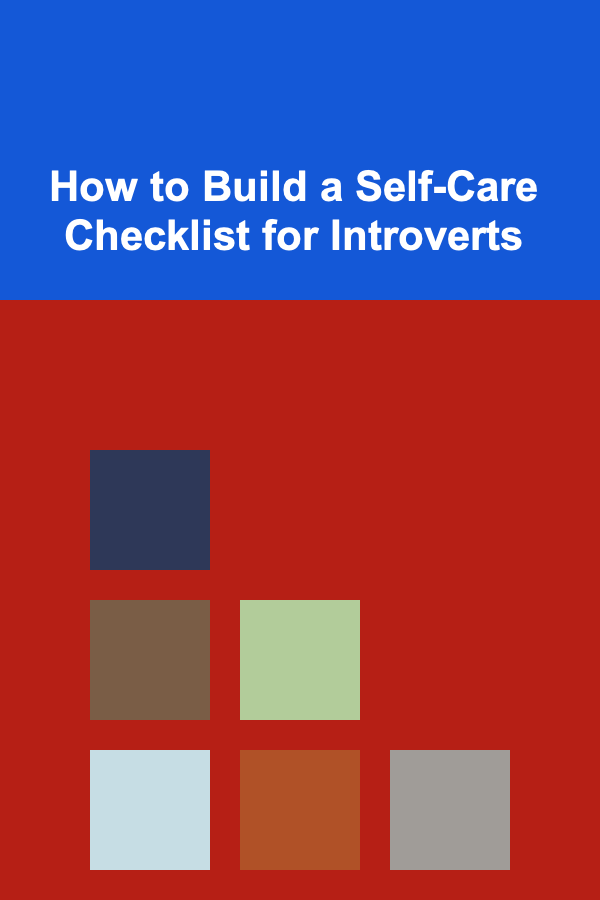
How to Build a Self-Care Checklist for Introverts
ebook include PDF & Audio bundle (Micro Guide)
$12.99$9.99
Limited Time Offer! Order within the next:

Self-care is essential for everyone, but for introverts, it holds special importance. Introverts often gain energy from solitude and quiet environments, but can sometimes feel drained by the demands of social interactions and busy schedules. This makes self-care a crucial practice in maintaining balance, mental health, and overall well-being. Creating a self-care checklist tailored to the needs of an introvert can provide a structured yet flexible approach to rejuvenation and personal growth.
In this article, we'll explore various elements that can help build a self-care checklist specifically designed for introverts. We'll break it down into easy-to-follow steps and activities that help cultivate a sense of peace, energy, and focus.
Why Self-Care Is Vital for Introverts
Introverts are often misunderstood as shy or antisocial, but this isn't the case. The key distinction is that introverts tend to feel mentally and physically drained after extensive socializing, especially in larger groups or loud environments. While social interaction is still important, it's how introverts recharge that differs.
Self-care for introverts focuses on creating balance---allowing time to retreat, reflect, and reconnect with their inner selves. When introverts engage in self-care practices that align with their personality, they can recharge and stay healthy in mind, body, and spirit.
Prioritize Alone Time
1.1 Understand the Need for Solitude
Introverts often thrive in solitude, as it provides the opportunity for reflection and self-renewal. Carving out specific time alone every day can be incredibly rejuvenating. Whether it's in the form of quiet mornings, peaceful walks, or a few hours spent reading, ensure you have dedicated "me-time" that allows for deep thinking and emotional processing.
1.2 Create a Safe Space at Home
Designate a space in your home where you can retreat to when you need to be alone. This could be a cozy corner with comfortable seating, soft lighting, and items that bring you peace---books, music, or art. By establishing a physical space that supports your introverted needs, you create an environment that helps you feel calm and at ease.
1.3 Build Boundaries for Alone Time
While it's important to connect with others, introverts should recognize their limits. Setting boundaries with friends, family, and colleagues allows for the balance between social time and solitude. Politely decline invitations when you're feeling overwhelmed, or schedule time for yourself after social events to regain your energy.
Engage in Reflective Practices
2.1 Journaling
Journaling is a powerful self-care practice for introverts, allowing them to process emotions and thoughts in a private, personal way. Writing daily or weekly can help clarify feelings, set intentions, and track personal growth. It's a space for exploring both the light and heavy aspects of life, helping introverts maintain mental clarity.
How to get started:
- Write for 10-15 minutes each day.
- Reflect on emotions, goals, or things you're grateful for.
- Use prompts like "What made me happy today?" or "What challenges am I facing?"
2.2 Meditation and Mindfulness
Meditation is a wonderful practice for introverts because it doesn't require external social interaction. It's a form of deep reflection and grounding, helping to quiet the mind and reduce anxiety. Even just 10-20 minutes per day can provide immense relief, allowing you to center yourself and regain focus.
Mindfulness techniques:
- Focus on your breathing for a few minutes each day.
- Practice being fully present during routine activities, like eating or walking.
2.3 Deep Thinking Time
Allow yourself time to think deeply and process ideas. Introverts tend to have rich inner worlds, so it's important to honor and nurture that. Whether through long walks, sitting in a park, or lying on the couch, give yourself permission to be alone with your thoughts without distractions.
Cultivate Quiet Hobbies
Introverts often find fulfillment in hobbies that allow them to engage quietly and deeply. Whether it's reading, writing, painting, or playing an instrument, these activities provide a sense of personal growth and satisfaction. Hobbies also serve as an outlet for creativity and emotional expression.
3.1 Reading
Reading is a favorite activity for many introverts, as it allows them to escape into different worlds, learn new things, or simply unwind. Building a habit of reading---whether novels, non-fiction, or poetry---can be a therapeutic self-care activity.
Tips for building a reading habit:
- Set aside 30 minutes to an hour each day for reading.
- Keep a list of books you want to read and set small goals for completion.
- Create a cozy reading nook in your home.
3.2 Creative Writing or Artistic Expression
Engaging in creative outlets like writing or painting allows introverts to express their innermost thoughts and feelings in a safe and private manner. Whether it's writing short stories, keeping a blog, or engaging in visual arts, creating allows you to process and articulate your thoughts.
Ideas to get started:
- Keep a small notebook for sketching, doodling, or writing poetry.
- Start a personal blog or create a private journal for your writings.
- Experiment with different mediums, like watercolor, charcoal, or digital design.
3.3 Gardening or Nature-Based Activities
Spending time outdoors, especially in a garden or natural setting, can help introverts relax and feel grounded. Gardening, in particular, offers a sense of accomplishment and connection to nature, which can help alleviate stress.
Ways to incorporate nature:
- Start a small garden at home---whether it's herbs, flowers, or vegetables.
- Take walks in local parks or nature reserves.
- Practice "forest bathing," or simply sitting outside and breathing in fresh air.
Focus on Health and Wellness
Introverts, like anyone else, need to take care of their physical and mental health. Engaging in health practices that nourish the body and mind is essential for overall well-being.
4.1 Regular Exercise
Physical activity helps reduce stress, boosts mood, and improves overall health. For introverts, solo activities like yoga, swimming, or jogging can be ideal. Choose an activity that you enjoy and feel comfortable with, and make it a regular part of your routine.
Introvert-friendly exercises:
- Yoga or Pilates for mindful movement.
- Hiking or walking in peaceful, nature-filled areas.
- Swimming or cycling for individual, focused exercise.
4.2 Adequate Sleep
Rest is crucial for introverts to recharge. Poor sleep can result in feeling drained and overwhelmed, affecting emotional well-being and cognitive function. Establish a sleep routine that ensures you get enough restful sleep each night.
Sleep tips:
- Aim for 7-9 hours of sleep each night.
- Create a calming bedtime routine---dim the lights, read, or listen to soothing music.
- Avoid screen time at least 30 minutes before bed.
4.3 Healthy Nutrition
Eating nutritious foods that promote energy and mental clarity can make a significant difference in how you feel. Consider incorporating more whole foods, fruits, vegetables, and lean proteins into your diet, and avoid excessive caffeine or sugar, which can lead to energy crashes.
Healthy eating habits:
- Plan balanced meals with a focus on whole grains, lean proteins, and plenty of vegetables.
- Stay hydrated with water or herbal teas.
- Minimize processed foods and sugary snacks.
Manage Social Interactions
While introverts need alone time, they also value meaningful connections. However, socializing can feel draining if not managed properly. It's important to find a balance that works for you---giving yourself permission to rest and rejuvenate after social events is key to maintaining energy.
5.1 Schedule Social Events with Care
Social events should be chosen carefully, ensuring that they align with your energy levels. You don't need to attend every gathering or be constantly socializing. Prioritize smaller gatherings or one-on-one interactions that feel more manageable and enjoyable.
5.2 Set Social Boundaries
Being clear about your social boundaries is essential. Don't be afraid to excuse yourself from gatherings when you need rest. Let your friends and family know that your need for alone time is important, and most will understand.
5.3 Be Selective About Your Circle
Surround yourself with people who respect your introverted nature and who bring positivity to your life. It's important to nurture relationships with those who value quality over quantity in social interactions.
Embrace Relaxation Techniques
Introverts often find relaxation through activities that soothe the mind and body. Taking time to unwind and release stress is an essential aspect of self-care. Experiment with different methods to see what works best for you.
6.1 Aromatherapy
Using essential oils can have a calming effect on the mind and body. Lavender, chamomile, and sandalwood are known for their relaxing properties. Use a diffuser, light scented candles, or apply diluted oils to pulse points for a soothing experience.
6.2 Take Epsom Salt Baths
A warm bath with Epsom salts is a perfect way to unwind and relax. The magnesium in the salts can help ease muscle tension and promote relaxation. Add candles, music, or a good book to make the experience even more enjoyable.
By integrating these practices into your daily routine, you can build a self-care checklist that aligns with your introverted nature. Embrace the quiet moments, engage in activities that nurture your spirit, and honor the need for rest and solitude. With a tailored approach to self-care, introverts can thrive and feel empowered to lead balanced, fulfilling lives.
Reading More From Our Other Websites
- [Paragliding Tip 101] The Midnight Launch: Chasing the Aurora Borealis on a Paraglider
- [Home Budget 101] How to Budget for Family Activities Without Going Overboard
- [Mindful Eating Tip 101] Eating with Intention: Real-World Success Stories of Mindful Recovery from Binge Eating
- [Paragliding Tip 101] Best High‑Performance Paragliding Wings for Competitive Speed Flying
- [Organization Tip 101] How to Organize Your Sports Equipment for Traveling Teams
- [Organization Tip 101] How to Organize Your Toolbox for Quick Access
- [Organization Tip 101] How to Create a Crafting Playlist for Inspiration
- [Tie-Dyeing Tip 101] DIY Tie-Dye Home Décor: Transforming Everyday Items into Artful Statements
- [Home Budget Decorating 101] How to Decorate Your Home Using Only Budget-Friendly Furniture
- [Home Security 101] How to Use Timers for Lights and Electronics to Deter Intruders

How to Choose the Right Toys for Your Pet
Read More
How to Save Space by Reducing Furniture Clutter
Read More
How to Successfully Negotiate for Lower Prices Without Feeling Awkward
Read More
How to Write a College Application Essay for a Specific Major
Read More
Smart Strategies for Saving on Internet and Cable Bills Every Month
Read More
How to Reduce Digestive Issues with Food
Read MoreOther Products

How to Choose the Right Toys for Your Pet
Read More
How to Save Space by Reducing Furniture Clutter
Read More
How to Successfully Negotiate for Lower Prices Without Feeling Awkward
Read More
How to Write a College Application Essay for a Specific Major
Read More
Smart Strategies for Saving on Internet and Cable Bills Every Month
Read More